

|
A r t i c l e s A n d C a s e
S t u d i e s
On Track!
Many horse owners interested in keeping their horses naturally have set up the
track or race system of pasture management, with great results. Teresa Ramsey,
SHP, of
Natural Hoof explains.

The track system of pasture management involves an external race
either around the perimeter of the property or if that is not possible, many
horse owners are simply using tapes around the perimeter of their paddock. The
internal paddocks are then etiher strip-grazed or shut up for hay, depending on
the season.
The main advantage to this kind of pasture management is that it more closely replicates the way horses naturally live in the wild in that it encourages more movement for the horses as they forage for food, resulting in excellent hoof health and fitness.
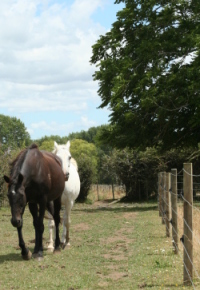 Better Condition
Better Condition
Horses on the track system look more toned and conditioned, gone is the soft
flabby horse often seen in paddock situations.
This is because horses get more exercise on the track system, as the dominant horses will move the others along, and they can only move further along the track, which results in more movement. In a wide paddock, they can move in any direction, for just a few steps to get out of the way of the more dominant horse. Horses also have to look for their food, and are not so easily overfed on fresh grass.
Better Pasture
The track system results in improved pasture as it is rested for longer between
grazing, allowing better control of parasitic worms and increased undergrowth -
we have cut more hay with the track system. Manure is easier to pick up
as the grass is shorter on the track. We found a diet
including oats helps as birds pick through the manure on the track spreading it out, requiring less frequency for harrowing and better control of parasitic worms.
Contentment
The horses also seem to enjoy having access to the whole property, with a more
varied outlook and terrain. Horses, like other grazing animals, often fall into
single file to get from A to B, which is another reason why horses on the track
system of pasture management are more content, as they can move further and
stick together more as a herd. We often notice the horses have made walking trails within the race.
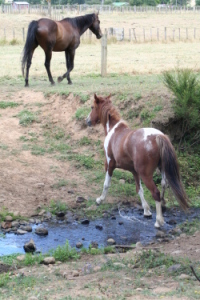 Our herd of 5-6 horses have lived on the track system for nearly two years now, and have access to steep native bush, a long bush track, many straights for galloping and playing, and two stream crossings, which ensure the hooves get plenty of moisture during dry weather.
Our herd of 5-6 horses have lived on the track system for nearly two years now, and have access to steep native bush, a long bush track, many straights for galloping and playing, and two stream crossings, which ensure the hooves get plenty of moisture during dry weather.
The horses can also rest and shelter under mature trees and hedges along the track and have access to a large area around our back shed. Most of the track can be seen from the house, and runs right past our back yard, so they are well de-sensitised to noisy kids playing, washing flapping on the line and we can enjoy watching our horses from the deck, as well as keep an eye on them.
More Movement
We have been amazed at how many laps the horses will do in a day, and estimate
they will travel about 8-10km per day, which is close to the horses' natural
amount of movement of 15-20km, when you factor in miles covered during riding time.
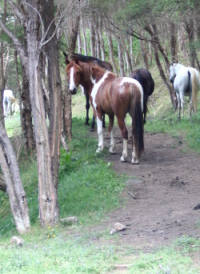 Movement is important not just for fitness but also for hoof health. Hooves of a
barefoot, naturally trimmed horse will expand upon weight bearing and contract
when the hoof is lifted. This enables good circulation to the hoof, which is
required for healthy horn growth, a healthy heart and good health overall.
Movement is important not just for fitness but also for hoof health. Hooves of a
barefoot, naturally trimmed horse will expand upon weight bearing and contract
when the hoof is lifted. This enables good circulation to the hoof, which is
required for healthy horn growth, a healthy heart and good health overall.
Better Hooves
We have noticed that our horses all have improved hoof horn quality and thickness since being on the track system. Also, the hooves wear more, making trimming easier.
This also helps with rehabilitation of horses that have hoof problems, as the
increased footsteps result in the increased circulation required for healing of the
internal tissues of the hoof. Also, full decontraction of badly contracted
hooves has only been possible since we put the track in place.
A word of caution with rehabilitation of sick or lame horses on track systems:
if the horses do a lot of running about it can cause inflammation of the hooves
and in extreme cases, be careful of 'road' founder. Though movement is important
for healing, extreme rehabilitation horses may require a separate track system within a paddock with one other quiet horse to look after them until they are well enough to use the main track with the herd.
Jill's Story:
"I was quite sceptical about the track idea when I first heard of it, but . . . the track system has been my saving grace so to speak. My horses have all changed so much in their "contentedness". Keeping them "on the brown and limiting the green" has been so good for them - their characteristics, their muscle structure, their fitness; overall - they just seem happier horses to deal with. Instead of slowly coming across to see me when I arrive they trot or canter around the track ... interesting!!!!.
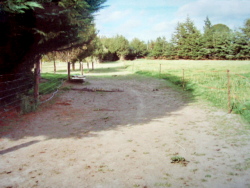 I have 2 x 420metre tracks set up around my paddocks and have incorporated a hoof bath into one. The mucking out is SO MUCH easier too. All poo is on brown dirt so easy to pick up, and no grass amongst it!
I have 2 x 420metre tracks set up around my paddocks and have incorporated a hoof bath into one. The mucking out is SO MUCH easier too. All poo is on brown dirt so easy to pick up, and no grass amongst it!
As for managing the grass in the middle, I let them in for an hour or so while I attend to my various chores, and of course I cut that for hay.
I feed hay every day around the track - and usually in a different place from the day before to encourage their movement and natural "seeking out" abilities.
I really haven't come up against any disadvantages at all ... perhaps the extra walking I have to do, but hey that's actually a good thing!!!!" - Jill Dickie, Christchurch, New Zealand.
--------------
Penny Gifford's Story:
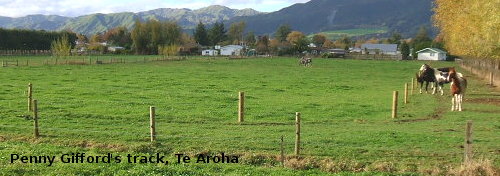
Penny Gifford, SHP, of Te Aroha, has noticed huge improvements in her horses' health
and fitness after putting in a race around the exterior of most of her 8 acre
property (above).
"One of the main advantages of the track system is being able to give as much movement as
possible without over feeding the horses. With more movement all the
horses(especially the fatter ones) have stabilised their weight.
They can all
stay together as a herd no matter if they are a minature or a big horse. All
horses are calmer. Visitors comment on how calm and happy the horses are, with
one client referring the property as "horse heaven!"e.
Pasture is rested for as long as necessary. Green pasture is
availble fresh daily for natural grazing choice.
All horses have forward movement and free choice of shade and shelter. Small
property management is easier and more
economical.
It's also a great place to ride round. This has been the most
significant benefit to all my horses that I have ever made." - Penny Gifford, SHP, Te Aroha, New Zealand.
--------------
Duncree Shetland Pony Stud
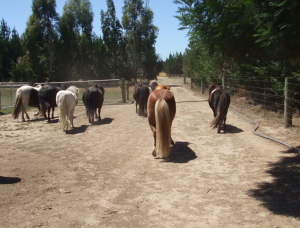
Catherine Crosado of the Duncree Shetland Pony Stud in Christchurch, NZ, also
uses the track system with her stud of nearly 30 ponies:
"The only disadvantage of the track for me is that after nearly four years,
I'm going to have to do some maintenance on the track. Build it up in some
areas as it has become so compacted, it doesn't drain. It also gets pretty
dusty in the summer. There's quite a bit off "hoof traffic" as well as quad
bike traffic, so I'm investigating different surfaces. My end goal is to
have different materials such as stones and gravel to provide more variety
for the hooves. Other disadvantage with the numbers I have, is that the
manure is every where!! Had to invest in a paddock vacuum cleaner as it took
me so long to clean up.
Advantages. Fitter ponies. They learn to move as a herd and move when the
herd moves. Foals learn to work out gates and fences from a very early age.
Lots of places to put hay feeders. Trees in different areas provide shade at
different times of the day. I move the water trough around to provide a bit
of variety as well as block parts off to change the environment for the
ponies.
They do use it as a race track and chase each other around, which is
hilarious. I never shut the ponies off the grass, I get worried that people
see it as way of locking up ponies, but the hay feeders are on the track,
so they regularly leave the grass for hay. They always have option of grass
or hay. With the hay feeders, I can put out a few days worth of hay in one
go, so it's less work feeding out hay.
I think overall, once the human adapts to it, the advantages far out way the
disadvantages."
For more about keeping
Shetlands, visit our article Strasser Method for
Shetlands.
If you'd like to add your comments about your track system, please click here to email
Teresa of Natural Hoof.
Submit an Article or Case Study
The more we share information, the better off our
horses are going to be. If you'd like to share your
story, please email the
editor.
Disclaimer: Natural Hoof
reserves the right to change or edit any part of
all articles and case studies submitted to this
website. Natural Hoof does not take any
responsibility for the content of any articles
and/or case studies and/or any misapplication of the information presented in any articles. Natural Hoof presumes readers consult a professional for more information about any topic covered in any Natural Hoof article.
Home | Articles | Study Groups | Clinics-Events | Brag | Classifieds |
Order | Links


|
|









